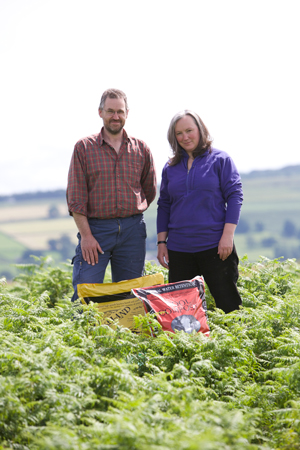Regenerative gardening key to soil health
Our friends at Dalefoot Compost outline how you can improve the health of your soil and benefit your plants, wildlife and carbon storage.
Predicted to be one of the key horti’ trends for 2023, ‘regenerative gardening’, helps you love your outdoor plot by working in tune with nature.
Good soil health is a first vital step for improving the natural health and fertility of your garden and the experts from Dalefoot Composts outline below some ways you can actively improve your soil, essential for your plants, wildlife and carbon storage.
 With decades of ecology and land management experience under their belts, award-winning Dalefoot Composts, who are based in Cumbria, make premium peat-free composts as well as restoring damaged UK peatlands, so are expert in working with nature to improve the environment. (Pictured left Dalefoot co-founders Jane Barker and Simon Bland).
With decades of ecology and land management experience under their belts, award-winning Dalefoot Composts, who are based in Cumbria, make premium peat-free composts as well as restoring damaged UK peatlands, so are expert in working with nature to improve the environment. (Pictured left Dalefoot co-founders Jane Barker and Simon Bland).
Working across the country with agencies such as Natural England, NatureScot and the Wildlife Trusts, in 2022, Dalefoot announced a total of 3.8 million tonnes of carbon had been saved through their restoration projects.
Peat bogs store more carbon than rain forests and many in the UK are now in poor condition, releasing carbon rather than storing it. By regenerating the peat bogs we are helping the climate and restoring the natural balance of the bogs to functioning, healthy eco-systems.
In the same way, the health of the soil in our gardens is just as important. Productivity and disease resistance enables bugs, bees, animals and birds to thrive, issues with flooding and heat are minimised and moisture retention gets better.
Co-founder Professor Jane Barker points out that ‘regenerative gardening’ is gardening for the future and a way in which we can all take steps to limit climate change through our gardening.
The Royal Horticultural Society (RHS) shares public concern in reducing peat use to minimise the effects of global peat extraction and have pledged to be peat-free by 2025. Defra has a target of total withdrawal of peat use by amateur gardeners and a requirement that the commercial horticultural industry will be peat-free by 2030. Natural England has embarked on the first round of funding for Peat Restoration grants with five new landmark projects to restore England’s peatlands to a natural and healthy state.
We can all play our part, no matter how small, so follow Jane’s five simple steps to becoming a regenerative gardener:
💚 Love your soil – nourishing and protecting your soil is critical as poor, depleted soil leaks carbon into the atmosphere, grows weak crops, and erodes, so is more prone to flooding. Use ‘no dig’ methods to improve your soil structure and encourage beneficial mycorrhizal fungi and apply an organic mulch at least once a year to feed the earth.
A soil conditioner like Dalefoot’s Lakeland Gold is perfect, adding essential nutrients and enriching your garden so it can flourish.
Seek out plants that are good carbon stores, such as amaranth, a ‘poster plant’ for regenerative gardening. Fast-growing, both its leaves and seeds are edible and its plentiful dark green leaves maximise photosynthesis. Carbon is sequestered into its extensive roots, which in turn create air pockets aiding the development of healthy soil. The plant is tolerant to dry hot conditions and doesn’t require artificial fertiliser.
♻️ Reduce, reuse and recycle – cut down on what you buy for the garden, get creative on what you reuse and recycle as much as you can. Make your own compost or leaf mould, and boost with peat-free fertiliser to balance – Dalefoot’s Wool Compost Double Strength is designed to mix 50/50 with spent compost. Plant seeds in empty toilet roll tubes, harvest seed from your plants, use water butts to store water, and maintain your tools instead of throwing them away.
🌳🌻🍎 Mix it up – plant a wide variety of annuals, perennials, fruit, vegetables, trees and shrubs to improve the biodiversity of your garden.
🌼 🥕 Companion planting – instead of using harmful chemicals, grow key plants together to ward off pests, attract pollinators and prevent disease. Orange Calendula (pot marigold), Tagetes (French marigolds), colourful nasturtiums, garlic, basil and borage are all excellent plants to twin with various fruit and veg.
Rewilding your garden – let part of your garden grow wild to encourage beneficial bugs and wee beasties. Install a wildlife pond and bird boxes, raise fence panels for hedgehog highways, take part in No Mow May, allow weeds to bloom, plant native wildflowers and leave dead leaves where they fall on your borders.
Dalefoot have an extensive range of peat-free composts made from bracken and sheep’s wool available from a wide range of stockists and online at www.dalefootcomposts.co.uk


